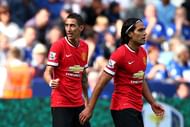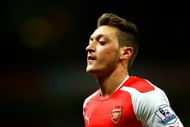It was meant to be another mazy winger gracing the Stretford End. It was meant to put the disaster that was the 2013/14 season out of memory. It was meant to be the marquee signing that declared Louis van Gaal’s intentions to bring the Red Devils back to the pinnacle of English football. It was meant to be the return of the number 7 to Manchester United.
As it turns out, it wasn’t meant to be. The transfer of Angel di Maria to Paris saint-Germain comes merely one year after the Argentinean was welcomed to Old Trafford amid much fanfare and promises of glory. Which begs the question- What went wrong? Who was responsible for a move cut short in its infancy? Couldn’t di Maria have waited another year to have a proper crack at a Manchester United career?
To understand better di Maria’s brief stint in England, one needs to look no further than his former Real Madrid teammate, Mesut Ozil, who joined Arsenal one year prior to the former’s arrival to England.
Similar Beginnings
The atmosphere surrounding the arrival of di Maria and Ozil to England from Real Madrid had striking similarities. Despite having successful previous seasons, both had been pushed to the periphery at Santiago Bernabeu by Florentino Perez’s new signings.
English clubs (Arsenal and Manchester United in this case) saw an opportunity to land world-class talent and had the money to attain their services. The resulting transfers brought excitement to dizzying levels among Arsenal and United fans alike and offered Ozil and di Maria a chance to show Real Madrid what exactly they had given up on.
The buoyant atmosphere around them brought out the best in Ozil and di Maria. Ozil began 2013/14 with his trademark assists left, right and centre, drawing goals out of Olivier Giroud, Theo Walcott and Aaron Ramsey, while di Maria brought some much needed pace and creativity to the Red Devils, backing it up with goals, including this delightful chip in the 5-3 defeat to Leicester City.
Emerging Differences
That is where the similarities ended. Although it can be said that the form of Ozil and di Maria started to dip at about the same stage of their first season, the reasons for their decline were starkly different.
Ozil, notorious for his low stamina levels, began to feel the rigors of English football, especially during the gruelling Christmas and New Year fixtures. His form reached a new low in the 5-1 defeat to Liverpool at Anfield, where he was constantly harried off the ball. By the end of the season, it was evident that, regardless of his football talent, Ozil needed to develop physically to cope with the Premier League.
Things were different with di Maria. The slender frame of the Argentine winger, which had earned him the nickname ‘El Fideo’ or The Noodle, had raised doubts over his ability to deal with the physical nature of English football. However, his lean body turned out to be his strength, enabling him to evade the clutches of the tough-but-not-so-mobile Premier League defenders. This, coupled with his speed, stamina and defensive work rate, meant di Maria was born to play on the wing in England.
The first signs of di Maria’s possible unrest appeared in November 2014, when he admitted in an interview that he would have moved to Paris saint-Germain but for the Financial Fair Play restrictions. A subsequent hamstring injury later that month, accompanied by loss of form and reports of an attempted burglary in his Cheshire home in February added fuel to rumours that the Argentine would rather be somewhere else.
The Role of Managers
Louis van Gaal did not help matters. The Dutchman had publicly stated his desire for a player like di Maria on his arrival in July 2014. After the initial flourish, however, van Gaal began to find it difficult to accommodate di Maria in a Manchester United team built on his philosophy.
The former Bayern Munich manager played di Maria in central midfield, on the left wing, on the right wing, behind the strikers and even as a second striker in his quest for a perfect role for the former Real Madrid man. Moreover, his emphasis on a passing game and not losing possession was only catering to di Maria’s weaknesses.
Off the pitch, van Gaal instructed all his players to speak in English, including Antonio Valencia, who had been at the club since 2009. His team-selection was based on recent performances in training and superstar names held no importance for him whatsoever. Mavericks like Rafael, Robin van Persie and di Maria were dropped if they did not adhere to the ‘philosophy’.
Contrast this with Arsene Wenger’s approach to Mesut Ozil. The Frenchman has often been criticized for his socialist approach to football himself, but let Ozil know in no uncertain terms that the German playmaker was special in his eyes.
Wenger publicly backed Ozil in times of indifferent form and considered it a matter of time before “der Rabe” would adjust to Premier League. He also had a clearly-defined role for the German international- Ozil was to shoulder the responsibility of unlocking opposition defences with Cazorla and set up chances for forwards and goal-scoring midfielders like Wilshere, Ramsey and Walcott.
The manager’s unflinching support convinced Ozil to stay at Arsenal and slug it out where di Maria seemed to give up. In hindsight, di Maria’s stay in Manchester was doomed from the beginning- a burning desire to move to Paris, compounded by failure to adjust to life in England, the lack of a clear-cut role as well as the feeling of being unwanted under van Gaal ensured he would turn his back on United and try his luck somewhere else.
The Human side of Football
For us football fans watching games from the stands or on television, footballers invariably become the objects of our fantasy. The di Maria saga is a reality check for those of us who wonder why someone having the iconic number 7 jersey at Old Trafford would quit without having a proper shot at a possibly-glorious Manchester United career.
The reason is simple- Angel di Maria was not happy at Manchester United. His wife and child were not happy living in North-West England, his boss did not utilize his talents well enough and he had the opportunity to solve all these problems in one stroke by joining Paris saint-Germain.
It might be convenient to say that he could have followed the example of Mesut Ozil, but the same allegations of being a bottler had been levelled against Ozil when he left Real Madrid for Arsenal. Guess who was praised that season for being a fighter? Then-Real Madrid midfielder Angel di Maria.
At the end of the day, footballers are men doing what they do best, and stay at, or leave a club for their professional development and personal satisfaction. The culture of a country becomes as significant as the playing position and the needs of family assume equal, if not more importance than those of the team.
Whether di Maria (or Ozil, for that matter) has made the right decision, remains to be seen. In the meantime, this Manchester United fan will understand his reasons and move on.


